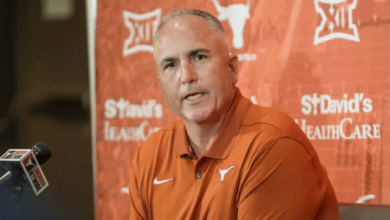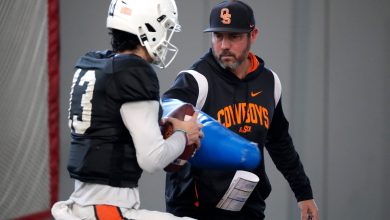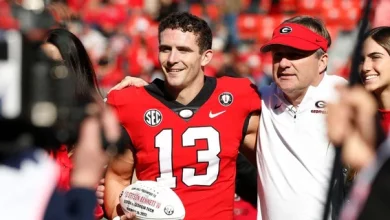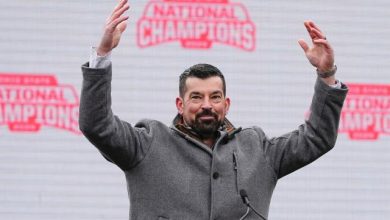How Ryan Grubb can improve Alabama’s football offense and the effects of his hire
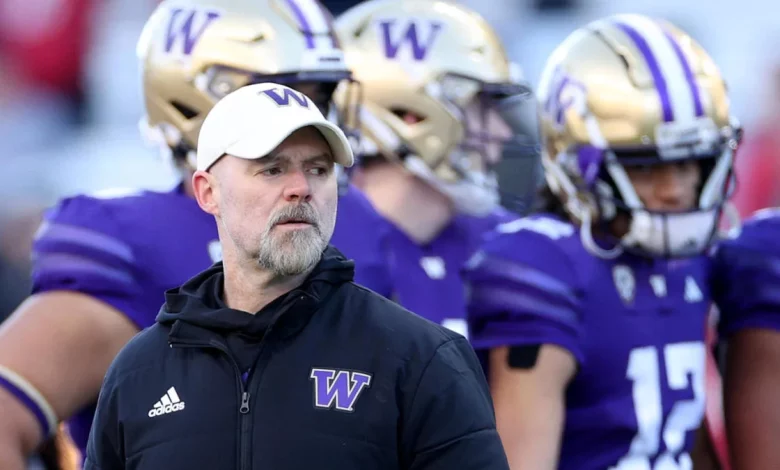
When it was announced that Ryan Grubb would be joining Alabama’s coaching staff as offensive coordinator, the news sent shockwaves through the college football world. Grubb, the former offensive coordinator at the University of Washington, was known for his innovative and dynamic offensive schemes that helped turn the Huskies into one of the top offensive units in the Pac-12. For Alabama, a program that has dominated college football under head coach Nick Saban but has at times struggled to consistently put together an explosive, balanced offense, Grubb’s arrival could be a pivotal moment in the program’s evolution.
The Current State of Alabama’s Offense
Alabama football, for much of the Saban era, has been synonymous with dominant defense, strong special teams, and a power-run game. While the offense has certainly been potent during this time, there have been seasons where it fell short of expectations—particularly in terms of adapting to the modern game, where spread concepts, dynamic passing attacks, and up-tempo offenses have become increasingly important.
In recent years, there has been a noticeable shift in college football toward high-scoring offenses, fueled by quarterback-centric systems that spread the field and utilize tempo to tire out opposing defenses. Alabama’s offense, under Saban, has generally been more run-heavy, relying on a powerful offensive line and talented running backs to control the game. However, with the evolution of the sport and the growing influence of offensive-minded coaches, there has been increasing pressure for Alabama to become more adaptable and dynamic through the air.
Quarterbacks like Tua Tagovailoa, Mac Jones, and Bryce Young helped elevate Alabama’s passing game to new heights in recent seasons, but the consistency of the offensive system has sometimes been questioned. There has also been a tendency to see Alabama’s offense hit a ceiling, especially in games where defenses have been able to exploit a lack of offensive balance or adaptability.
Enter Ryan Grubb, who arrives with a reputation for turning around the Washington Huskies’ offense and tailoring a system that maximized his players’ strengths while remaining innovative and adaptable. His hiring could provide the missing piece that Alabama needs to take the next step forward, especially in an era where offensive firepower is increasingly central to a team’s success.
Grubb’s Offensive Philosophy and Strengths
Ryan Grubb’s offensive philosophy is rooted in a modern, up-tempo, pass-first attack, but it is also grounded in a commitment to balance and a versatile running game. His time at Washington under head coach Kalen DeBoer was marked by significant improvements on the offensive side of the ball. In 2022, Grubb’s first season as the offensive coordinator, the Huskies’ offense ranked among the top in the country, finishing 14th nationally in total offense and 10th in passing offense. The passing game was led by quarterback Michael Penix Jr., a transfer from Indiana who flourished under Grubb’s system, throwing for over 4,000 yards and 30 touchdowns.
One of Grubb’s key strengths is his ability to design an offense that is efficient, creative, and capable of attacking defenses in a variety of ways. He’s not married to any one scheme or formation, but instead, he tailors his game plans based on his personnel and the defense he’s facing. Grubb is known for utilizing a quick-hitting passing game, which uses short and intermediate routes to quickly move the ball downfield. This style of offense is designed to create mismatches, exploit defensive weaknesses, and build rhythm with a quarterback who can operate within a structured, yet flexible, system.
Grubb also places a strong emphasis on the running game, understanding that it is critical to keep defenses honest and open up play-action opportunities. While the passing game might be the primary focus, he’s known for integrating a well-coordinated ground attack that complements his aerial assault. His offenses have a tendency to rely on multiple running backs, keeping fresh legs on the field and utilizing their skills in a variety of ways, whether that’s through outside runs, zone schemes, or screen passes.
Another key trait of Grubb’s system is the ability to adapt to different types of quarterbacks. Whether it’s a pocket passer or a more mobile signal-caller, Grubb’s offense doesn’t try to force players into a specific mold but instead works to maximize the talents of his quarterback. This flexibility will be an asset for Alabama, as the program currently finds itself in a period of transition at the quarterback position.
How Ryan Grubb Can Improve Alabama’s Offense
1. Developing a More Dynamic Passing Attack
One of the most immediate impacts Grubb could have on Alabama’s offense is in the development of a more dynamic passing game. The team has had success through the air in recent years, particularly with the emergence of talented quarterbacks like Tua Tagovailoa, Mac Jones, and Bryce Young. However, there have been times when the passing game lacked the consistency and rhythm that could propel the offense to elite levels. Grubb’s expertise in designing passing schemes that attack all areas of the field—quick slants, deep shots, screen passes, and everything in between—could give Alabama the variety it needs to keep defenses on their heels.
In addition, Grubb’s ability to scheme players open and provide quarterbacks with easy reads will benefit whoever takes over the starting role. Alabama has traditionally relied on talented quarterbacks, but those quarterbacks also thrived in part because of the structure and system around them. With Grubb, the offense could have more variety in terms of route concepts and more built-in flexibility, which could be particularly beneficial for a young quarterback still developing.
2. Improving Offensive Balance
Alabama has always been known for its strong running game, and Ryan Grubb will certainly emphasize that aspect of the offense. However, the challenge for Grubb will be maintaining a balance between the run and pass games that keeps opposing defenses guessing. In today’s college football landscape, an offense that is predictable in one way or the other can be exploited, and Grubb will work to ensure that the run and pass games complement each other.
By using more of a zone running scheme, combined with quick passing concepts, Grubb can create opportunities for Alabama to control the clock while still maintaining explosive plays through the air. This kind of offensive balance is important for any team looking to compete at the highest levels, as it prevents defenses from overloading one area of the field and gives the offense more options.
3. Maximizing Quarterback Play
The quarterback position has been a point of strength for Alabama in recent seasons, with high-profile quarterbacks like Tagovailoa, Jones, and Young. However, with the departure of Bryce Young to the NFL, Alabama finds itself with a battle at quarterback for the first time in several years. Grubb’s ability to work with different types of quarterbacks—whether it’s Jalen Milroe, Ty Simpson, or a potential future transfer—will be crucial in the coming seasons.
Grubb is known for his ability to develop quarterbacks and make them more effective in his system. He did this with Michael Penix Jr. at Washington, who saw a major resurgence under Grubb’s tutelage. If Grubb can apply the same principles to Alabama’s next starting quarterback, he could unlock the full potential of whichever signal-caller earns the role. Furthermore, Grubb’s system will allow quarterbacks to rely on short, quick throws as they develop confidence before taking on more complex deep-ball concepts.
4. Strategic Use of Playmakers
Another area where Grubb’s offensive acumen will benefit Alabama is his ability to strategically use playmakers in creative ways. Alabama has an abundance of talent at the skill positions, with running backs, wide receivers, and tight ends all capable of making big plays. Grubb’s offense is designed to get the ball into the hands of these playmakers quickly and efficiently, whether that means quick screens, slant routes, or getting running backs involved in the passing game.
By emphasizing quick passes and short-to-medium routes, Grubb can get playmakers like wide receiver Jermaine Burton, tight end Cameron Latu, and running backs Jase McClellan and Roydell Williams involved early and often. This not only helps in keeping defenses off-balance but also allows these players to develop more opportunities to make big plays in space.
5. Adapting to College Football’s Evolution
One of the most important aspects of Grubb’s hire is his ability to adjust to the changing landscape of college football. With many teams embracing fast-paced offenses, Alabama will need to ensure that it keeps pace with the rest of the country’s offensive units. Grubb’s familiarity with modern offensive concepts, especially in the passing game, will ensure that Alabama remains a competitive force in this new era of college football. His ability to mix tempo, adjust to defensive shifts, and play to his team’s strengths will be critical for Alabama to continue its dominance.
The Impact of Grubb’s Hire on Alabama’s Future
Ryan Grubb’s arrival at Alabama signals a significant shift in the program’s offensive philosophy. His track record as an innovative offensive mind, combined with his success at Washington, makes him a highly coveted coach in the college football world. For Alabama, this hire represents a new chapter in the Saban era, where the offense can evolve into a more explosive, balanced, and adaptable unit while still maintaining the core values of Alabama football.
In the long run, Grubb’s influence could be the key to helping Alabama stay on top of the college football landscape. His ability to work with quarterbacks, develop a more dynamic passing attack, and integrate offensive balance could make Alabama’s offense one of the most dangerous in the country, setting the stage for continued success and a potential return to national prominence in the ever-evolving world of college football.



